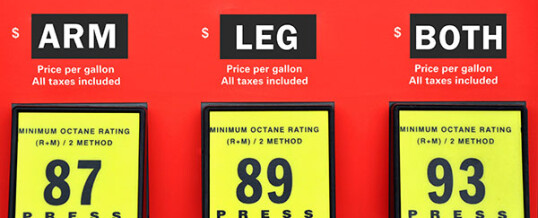
Filling up your car’s gas tank is like going to Las Vegas. You are betting that you can top off the tank before your money runs out. Sticker shock? You bet.
On Sept. 24, AAA reported that the national average price for a gallon of regular unleaded gasoline was $3.81, which is $0.29 more expensive than it was one year ago. When President Barack Obama took office, the average price of a gallon of gas was $1.85. The daily national average price has been the highest on record for each calendar day for more than a month.
If there’s one thing that hits everyone’s pocketbook, it’s the price of gasoline. Yet, where is the outcry? Virtually no one is talking about this issue anymore. The Obama administration is getting a free ride. Pun intended.
I read a fascinating item from the University of Southern California Annenberg Digital News that stated, “Jon Krosnick, a political science and psychology professor at Stanford University, analyzed 30 years of trends in gas prices and presidential approval for a forthcoming research paper. Comparing against other factors tied to approval ratings, Krosnick found that as gas prices rose, approval of the president’s job performance declined. A $0.10 increase in gas prices is associated with a decline in approval by a half a percent, he said.”
So, how can we explain that Obama’s approval is holding steady while gas prices soar and there are 25 million unemployed and underemployed Americans?
There are some weird things going on in this country when it comes to gas prices and politics.
A report from California News Service proposes that there is a “curious relationship between a state’s gas prices and presidential politics. The higher the price of gasoline, the higher President Barack Obama’s prospects of winning that state.”
“California, Illinois, Washington D.C. and New York — all solidly Democratic — are among the costliest for gas. Wyoming, Montana, Oklahoma and Utah — where Lyndon Johnson was the last Democrat to win the presidential vote — are among the cheapest.
An analysis by the news service reveals that 20 of the 22 states that voted against Obama in 2008 have gas prices that are below the national average, while more than 80 percent of states with prices above the national average voted for Obama in 2008.
Prices go up, but Obama’s approval ratings stay up? How does this happen?
A CBS News report might have the answer. “Now that the [gas] prices have become stable after the decline, and now that people understand that the small decrease in gas prices still leaves the cost too high, people have turned to other concerns. Americans have plenty to pick from.
“People are obviously tired — make that sick and tired — of the same headlines with no solutions in sight. Everything seems to be on hold and has been on hold since Obama became president. The proof is in the numbers — the approval rating numbers.”
And now Obama will catch another break just before the election. Most economists agree that gas prices typically begin to spike in the spring and peak in the summer. If prices follow the usual pattern, voters will notice a slight drop in gas prices through the fall, giving Obama something to crow about before Election Day.
When gas prices spiked in 2007 and 2008, the press crucified President George W. Bush. Yet, even when Obama’s approval ratings dropped as oil prices soared in April, the press gave him another pass. Approval ratings quickly bounced back up.
Let’s not ignore the root problem of our high gas prices, Obama’s quest for renewable energy, which Grover Norquist addressed in a recent Politico op-ed: “Renewable energy standards, by design, are intended to drive up energy costs — requiring utilities to use more expensive and often less reliable sources of energy. Not surprisingly, such laws have hit ratepayers hard. States that have a binding [renewable energy standard] now have electricity costs that are 39 percent higher than states that don’t have a binding [standard].”
Energy prices are soaring, taxpayers are paying more of their hard-earned money for basic necessities and companies aren’t hiring. The press and Congress remain silent. Our economic problems cannot be solved without stable, affordable and predictable energy sources and the most ridiculous thing about this whole mess is America has the capability to be energy independent if we had the political will to be so.
Is it not time that Obama be called out for our lack of a viable energy program?
We need to find the energy within ourselves to change course. This country can do better, much better. If we have to go through another four years of more of the same, then it’s time to turn out the lights.
OCT



